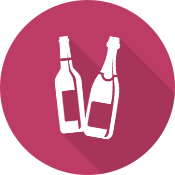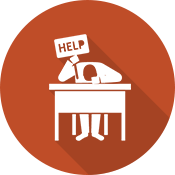- 1. Drinking Alone
- 2. Binge Drinking
- 3. Drinking to Cope with Stress
- 4. A Growing Tolerance to Alcohol
- 5. Drinking Without Regard to Consequences
- Sources
Is Drinking Bad?
Drinking alcohol can be a safe social activity when done in moderation. In fact, moderate consumption of wine can have numerous health benefits such as decreasing the risk of dementia and cardiovascular problems. However, excessive and overindulgent alcohol use is characteristic of far too many people. If you're concerned that your drinking behaviors may be compulsive or troublesome, then read on to learn 5 signs that your drinking habits might be dangerous.
1. Drinking Alone
There is a difference between having a couple drinks at the bar or a party with your friends or family and drinking alone.

If you find that you are often drinking alone, this may be a sign of deeper psychological or emotional issues.

Many people drink alcohol in order to cope with unwanted feelings or emotions such as sadness, depression, frustration, abandonment, etc.

Self-medication is not a healthy behavior and only further perpetuates the problem.
-

If you persistently drink alone as opposed to in social settings, you may want to consider seeking alcohol rehabilitation treatment.
Call
1-888-993-3112Who Answers? to speak to a treatment support staff member about inpatient rehabilitation programs.
2. Binge Drinking
According to the Substance Abuse and Mental Health Services Administration (SAMHSA), binge drinking is defined as "drinking 5 or more alcohol drinks on the same occasion on at least 1 day in the past 30 days."
It is recommended that
men don't drink more than 2 drinks per day and women don't drink more than 1 drink per day. This is considered to be moderate drinking behavior.
One drink is the equivalent of .6 ounces of alcohol, or:
Therapists are Standing By to Treat Your Depression, Anxiety or Other Mental Health Needs
Explore Your Options Today
Ad
- 5 ounces ("a shot") of 80 proof liquor.
- 5 ounces of wine.
- 12 ounces of beer.
- 8 ounces of malt liquor.
If you notice that you frequently engage in binge drinking, then you may need to evaluate your drinking habits. Binge drinking can lead to an addiction to alcohol and many physical ailments, for example:
- Liver cirrhosis (scarring).
- Pancreatitis (inflammation).
- Cancer.
- Liver.
- Mouth.
- Throat.
- Breast.
- Alcoholic hepatitis.
- Cardiomyopathy (stretching and weakening of heart muscle).
- Irregular heart beat.
- Stroke.
Binge drinkers are nearly 40% more likely to have a stroke as compared to those who don't binge drink and over 2 million people in the United States have a liver disease caused by alcohol abuse.
3. Drinking to Cope with Stress
Many people drink alcohol in order to cope with stressful situations in their lives, and although you may temporarily feel better from drinking, it usually ends up exacerbating stress in the long-run instead of relieving it.
If you turn to alcohol when problems arise in life, whether they have to do with school, work, or relationships, your drinking habits may be dangerous and you could be at-risk for developing a dependency and subsequent addiction.
Studies show that long-term alcohol consumption negatively changes the brain's chemistry and how it responds to stressful situations.
- The brain releases excessive amounts of cortisol and adrenocorticotropic hormone, which increases anxiety when faced with stress as compared to those who drink moderately or not at all.
- This increased anxiety in response to stress only further perpetuates the cycle of drinking to cope with stress.
- Furthermore, one study found that stress can decrease the desirable effects of alcohol, which may cause a person to drink even more to elicit a pleasurable response.
- In this manner, alcohol and stress influence each other in a bi-directional relationship.
Dual diagnosis facilities focus on treating any mental disorders that co-occur with alcoholism, which is incredibly important in maximizing recovery. Even if you don't feel that you're addicted, treatment can help to prevent an addiction.
Please call
1-888-993-3112Who Answers? and connect with a treatment program today.
4. A Growing Tolerance to Alcohol
Drinking alcohol increases tolerance over time, which means that the individual experiences a decreased effect when consuming the same amount of alcohol or an increase in alcohol is necessary to achieve the same desired effect.
This causes people to drink more than they previously did, which increases the risk for dependence and addiction.
Alcohol is metabolized by the liver, which breaks apart the alcohol molecule, making it possible to remove the toxin from the body.
- The liver enzyme responsible for alcohol metabolism is alcohol dehydrogenase and when a person consumes large amounts of alcohol over time, the liver produces more of this enzyme, which allows the body to eliminate the alcohol quicker.
- When the body gets rid of alcohol at a faster pace, blood alcohol concentration (BAC) is lowered and the desired effects are dulled.
- This is the mechanism responsible for metabolic tolerance in the liver and what causes people to consume more and more alcohol to achieve the same "buzz."
5. Drinking Without Regard to Consequences
Drinking can be safe when done in moderation and in responsible situations, but drinking without regard to the consequences can signify problematic drinking behaviors.
-
Drinking alcohol before driving is one major indication that your drinking habits have become dangerous, as you put yourself and others at risk when driving impaired.
-
Drinking heavily on a Sunday night or weeknight before you have to work the next day is one common sign that your drinking has become troublesome.
- Additionally, if you have a physical or mental health problem that you know is exacerbated by alcohol use, yet you continue to drink anyway, you may be dependent on alcohol and should seek rehabilitation before experiencing further negative ramifications.
- Finally, if your drinking is interfering with your work, relationships, hobbies, or is clashing with your values, yet you continue to drink, you should begin to evaluate the pros and cons of continuing to engage in this type of behavior.
Are you finding it increasingly difficult to abstain from drinking for a day or two? Do you crave alcohol on the days in which you don't drink? If yes, you might need treatment.
Don't hesitate to call
1-888-993-3112Who Answers? to speak to a treatment support representative and learn about the different alcohol recovery programs available to you.
Instantly Check The Insurance Coverage
- We’ll instantly check the coverage offered by your insurance provider.
- You may receive treatment at one of our facilities at a reduced rate.
- Though not required, entering your policy membership ID will help expedite your verification process.
Sources
- Hannah, R. (2012). Health benefits of wine and alcohol from neuroprotection to heart health. Frontiers in Bioscience, 4, 1505-1512. doi:10.2741/476.
- Centers for Disease Control and Prefention (2015, November 16).Frequently Asked Questions. Retrieved December 5, 2015, from http://www.cdc.gov/alcohol/faqs.htm.
- Drinking Levels Defined. (n.d.). Retrieved December 5, 2015, from http://www.niaaa.nih.gov/alcohol-health/overview-alcohol-consumption/moderate-binge-drinking.
- Alcohol Absorption | Health Promotion and Prevention Services | Colonial Health Center | Division of Student Affairs | The George Washington University. (n.d.). Retrieved December 7, 2015, from http://prevention.gwu.edu/alcohol-absorption.
- University of Rochester. (2014, April 10). Retrieved December 7, 2015, from https://www.rochester.edu/uhs/healthtopics/Alcohol/tolerance.html.
- Beyond Hangovers: Understanding alcohol's impact on your health. (2015, October 1). Retrieved December 8, 2015, from http://pubs.niaaa.nih.gov/publications/Hangovers/beyondHangovers.pdf.
- Alcohol Alert. (2012). Retrieved December 8, 2015, from http://pubs.niaaa.nih.gov/publications/AA85/AA85.htm.
- Emma Childs, Sean O'Connor, Harriet de Wit. Bidirectional Interactions Between Acute Psychosocial Stress and Acute Intravenous Alcohol in Healthy Men. Alcoholism: Clinical and Experimental Research, 2011; DOI:1111/j.1530-0277.2011.01522.x.
As advocates of mental health and wellness, we take great pride in educating our readers on the various online therapy providers available. MentalHelp has partnered with several thought leaders in the mental health and wellness space, so we can help you make informed decisions on your wellness journey. MentalHelp may receive marketing compensation from these companies should you choose to use their services.
MentalHelp may receive marketing compensation from the above-listed companies should you choose to use their services.
Ad


